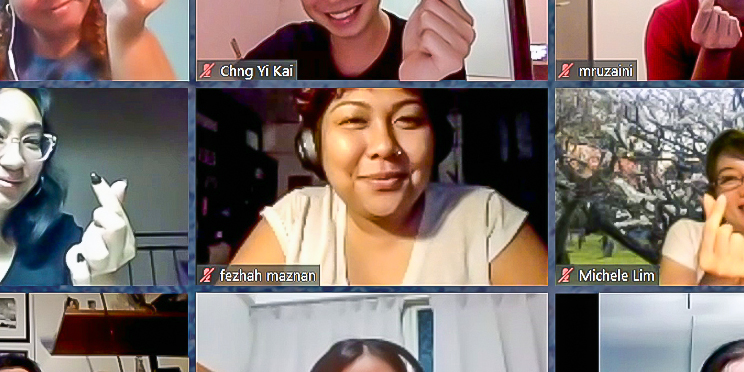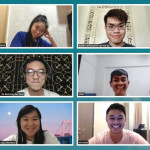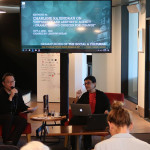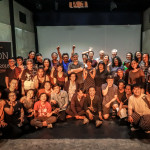
Fezhah Maznan amongst her fellow participants of the Dramaturgs’ Practice Development: Introduction to the Dramaturg’s Work online course in October 2020.
Fezhah Maznan is a producer for the Singapore International Festival of Arts (SIFA). In October 2020, she took part in Dramaturgs’ Practice Development: A Introduction to the Dramaturg’s Work (DPD), an online course that introduced performing arts practitioners to dramaturgy and the work of a dramaturg. The course was conducted by Dr. Robin Loon and spanned over four sessions throughout the month. We spoke with Fezhah on her experience on the course and how it shaped her understanding of dramaturgy and dramaturgs.
How did you come to know about dramaturgy?
The first symposium by the Asian Dramaturgs’ Network (ADN) in 2016 piqued my curiosity. What is a dramaturg? How do you even understand dramaturgy?
When I was a producer for the Esplanade [before joining SIFA], I got a better idea of what dramaturgy is even though I had no idea what the craft was. I was just going with my instincts.
I’ve been in theatre since I was 14. I’ve done writing, directing, designing, and stage managing. I later found myself in the production manager and producer roles, and I enjoy those. Because I’ve been in the rehearsal space, I understand what it entails to talk about process.
As a producer, I work with a lot of artists. I have the privilege to know what their concerns are and where their strengths lie. So sometimes, I’ll ask questions about the work. As I continue having conversations with these artists, they become more comfortable with me, and they grow to like the questions I ask.
Why did you join the DPD course?
When I told my husband Felipe [who is a lecturer at LASALLE College of the Arts] about my thoughts in approaching a work and analysing what I’ve seen, he said, “I think you might make a good dramaturg!”
Also, since leaving the Esplanade, I’ve been receiving invitations to be a dramaturg.
But I never saw myself as a dramaturg. There’s a bit of anxiety. Am I doing it right? What other tools or strategies are there?
What did you think a dramaturg was before the DPD course?
I thought a dramaturg needed to have a certain kind of domain expertise. Like when I produced Leda and the Rage by Edith Podesta in 2018, we worked with Rosemary [McGowan] as a dramaturg. She had domain expertise [in counselling and applied theatre].
I majored in Theatre Studies but I wasn’t a good student. And I thought a dramaturg needs to read a lot, a lot of books. You see [Lim] How Ngean, Charlene [Rajendran], Robin [Loon] – they all have PhDs. And I don’t! It gets really intimidating, especially when I attend ADN panels and I think, “Oh, I don’t think I’m that clever.”
What did you enjoy about the DPD course?
I enjoyed learning about the different kinds of dramaturgs. I also thought it was interesting to know some of the strategies and approaches.
I liked working with the other participants. There were people coming from different disciplines and different generations. I enjoyed the group work, even the extra time we put in outside of the course sessions. We were very task oriented, maybe because we would meet for group discussions on Zoom and we didn’t want to spend too much time onscreen.
And it was fun being taught by Dr. Loon again. I don’t remember him being this fabulous back when he taught me at NUS [National University of Singapore]!
Did you experience any difficulties in the DPD course?
No, actually. It wasn’t difficult. I thought Dr. Loon’s pedagogical approach was great. I could see what he was doing with the structure of his class. He would gently move you into concepts and break them down. He used quizzes, which I liked.
Has the DPD course helped you to feel more confident about dramaturgy?
I’m more assured now knowing that the questions I ask artists are in the right direction. The approach that I take to analyse a work is in the right direction. I’m definitely more interested in pursuing and further deepening my knowledge on dramaturgy.
Would you call yourself a dramaturg now?
No! It’s like reading an article on economics and then calling yourself an economist!
I’m really not comfortable calling myself a ‘dramaturg’ at this moment. I’m still experimenting. And I find people are very quick to label themselves, and I’m trying not to do that. It kind of boxes me up or creates expectations. I’m just going to go with the flow.
By Daniel Teo
Published on 24 February 2021
Fezhah is joining five other aspiring dramaturgs in 2021 for the follow-up Dramaturgs in Practice course, which will see the dramaturgs-in-training being attached to professional productions over the course of 10 weeks.





